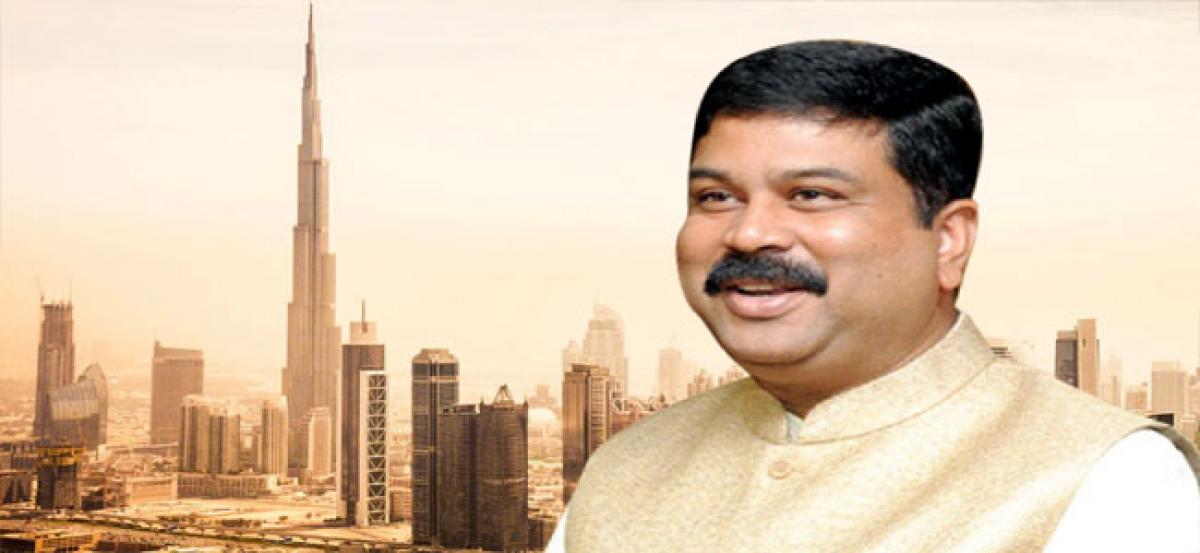Live
- First Impressions and Unboxing of the MacBook Pro M4: A Powerhouse for Professionals and Creators
- China Gears Up for Potential Trade War Amid Trump’s Tariff Threats
- Small Farmers Gain Less by Selling to Supermarkets: Study Reveals
- Why Despite the Controversy, America Is Anticipating the Mike Tyson vs. Jake Paul Fight
- Sanju Samson and Tilak Varma Shine: Record-Breaking Feats in 4th T20I Against South Africa
- India Urges $1.3 Trillion Annual Climate Support for Developing Nations
- Bad air: 106 shuttle buses, 60 extra Metro trips planned to make Delhiites give up cars
- WHO reports declining monkeypox cases in Congo
- CM Attends Kotideepotsavam on Kartika Purnima
- PKL Season 11: Raiding trio of Devank, Ayan, Sandeep help Patna Pirates rout Bengal Warriorz
Just In

With petrol and diesel prices touching multi-year highs, Oil Minister Dharmendra Pradhan today said the government is keeping a close eye on international prices but said there is no going back on free market pricing.
NEW DELHI: With petrol and diesel prices touching multi-year highs, Oil Minister Dharmendra Pradhan today said the government is keeping a close eye on international prices but said there is no going back on free market pricing.
He said consumers will benefit if petrol and diesel are brought under Goods and Services Tax (GST) regime at the earliest.Petrol price today hit a four-year high of Rs 73.83 a litre, while diesel rates touched an all-time high of Rs 64.69 in the national capital on rising international oil rates.
Read Also | Petrol, diesel prices soaring: What's stoking the fire"India needs market pricing to provide oil to all," Pradhan said at an event organised to mark the launch of Euro-VI grade petrol and diesel in the national capital.
Fuel pricing is based on a transparent mechanism, he said, attributing the spurt in rates to happening in international market. "When crude oil prices rise, naturally consumer feels a pinch," he said.
"We are concerned (about the impact on consumers). We are keeping a close eye on the developing international oil scenario," he said. He, however, did not offer any hint of a government intervention like cutting excise duty to give relief to consumers.
"Centre and state bank on tax revenues to meet developmental needs. 42 per cent of collections from excise duty (on petrol and diesel) goes to states and out of the remaining 60 per cent is used to fund centre's share in development schemes in states," he said.
Pradhan said the GST Council - the apex decision making body of the new indirect tax regime - should in the "interest of energy security and consumers" include petroleum products in GST.
Petrol, diesel, natural gas, crude oil and jet fuel (ATF) are currently not included in GST, which essentially leads to producers not being able to set-off tax paid on inputs from final tax on product.
The government, he said, had cut excise duty on petrol and diesel by Rs 2 per litre in October and some states had followed it up with a reduction in VAT (value added tax).
"When there is a pricing issue, states should respond and cut VAT," he said.
State-owned oil firms, which have been since June last year revising auto fuel prices daily, today raised petrol price by 10 paise per litre and diesel by 11 paise.
Petrol in the national capital now costs Rs 73.83 a litre, the highest since September 14, 2014 when rates had hit Rs 76.06. Diesel price at Rs 64.69 is the highest ever, with previous high of Rs 64.22 being on February 7, 2018.
India has the highest retail prices of petrol and diesel among South Asian nations as taxes account for half of the pump rates.The government raised excise duty nine times between November 2014 and January 2016 to shore up finances as global oil prices fell, but then cut the tax just once in October last year by Rs 2 a litre.Subsequent to that excise duty reduction, the Centre had asked states to also lower VAT but just four of them -- Maharashtra, Gujarat, Madhya Pradesh and Himachal Pradesh -- reduced rates while others including BJP-ruled ones ignored the call.
The central government had cut excise duty by Rs 2 per litre in October 2017, when petrol price reached Rs 70.88 per litre in Delhi and diesel Rs. 59.14. Because of the reduction in excise duty, diesel prices had on October 4, 2017 come down to Rs 56.89 per litre and petrol to Rs 68.38 per litre. However, a global rally in crude prices pushed domestic fuel prices far higher than those levels.
The October 2017 excise duty cut cost the government Rs 26,000 crore in annual revenue and about Rs 13,000 crore during the remaining part of the current fiscal year.
The government had between November 2014 and January 2016 raised excise duty on petrol and diesel on nine occasions to take away gains arising from plummeting global oil prices. In all, duty on petrol rate was hiked by Rs 11.77 per litre and that on diesel by 13.47 a litre in those 15 months that helped government's excise mop up more than double to Rs 2,42,000 crore in 2016-17 from Rs 99,000 crore in 2014-15.
State-owned oil companies — Indian Oil Corporation, Bharat Petroleum Corporation and Hindustan Petroleum Corporation — in June last year dumped the 15-year old practice of revising rates on the 1st and 16th of every month. Instead, they adopted a daily price revision system to instantly reflect changes in cost. Since then, prices are revised on a daily basis.

© 2024 Hyderabad Media House Limited/The Hans India. All rights reserved. Powered by hocalwire.com







